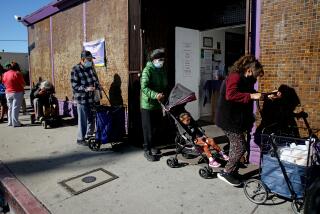A County Responsibility Does Not Absolve the City
- Share via
How we define an issue or problem is critical to the solutions we offer to address it.
The Ventura City Council voted recently to exclude programs serving the homeless and those recovering from substance abuse from its Community Partnership grant program.
In response to a follow-up report from City Manager Donna Landeros, Councilman Ray DiGuilio asked the important question: “What is the issue?”
The reply was simply, “homelessness,” and the city staff defined this by saying that most if not all homeless are indigent. The county is mandated by state law to be the safety net or provider of last resort for the care of indigents. Therefore, the reasoning went, if the county would provide more general relief housing vouchers, the homeless could all be housed in motels, and we wouldn’t need a shelter in our community.
But saying the county has greater responsibility for the homeless does not absolve the city of its responsibility. Unfortunately the problem is not that simple.
The Ventura County Homeless and Housing Coalition completed a process in 1996 that resulted in creation of a Regional Plan on Homelessness for Ventura County. The plan began by describing homelessness as a problem throughout the county. Although it recognizes that there are outstanding programs and services, there are not enough and they often lack coordination.
Homelessness includes two broad, sometimes overlapping categories of problems. For people living in crisis poverty, homelessness tends to be an episodic disruption, and emergency housing temporarily bridges the gap in their resources. Their lack of housing is often coupled with many other problems. The working poor and children are represented in this group.
The second group has chronic disabilities and homelessness appears to be a way of life. Although this group is the most visible, it actually includes a minority of those who become homeless. These individuals suffer from alcohol and drug abuse, mental illness and chronic health problems.
Accommodating the diversity and range of assistance needs will require development of a comprehensive, community-based continuum of care. The goal of the Regional Plan on Homelessness was to establish an integrated, effective and coordinated plan that addresses housing, support services, transportation, health services and employment opportunities to prevent and reduce homelessness.
The regional plan describes a continuum of care that begins with a point of entry and provides outreach, intake and assessment of needs of the homeless person. Adequate emergency and transitional housing with supportive services is also necessary to get people off the streets. Some of this housing should address the special needs of the victims of domestic violence, the mentally ill and people recovering from substance abuse. The continuum must include case management and supportive services to help people address the issues that contributed to their homelessness. And finally, every community should develop a large supply of permanent, low-income and affordable housing.
*
Homeless services are primarily funded through federal money that comes to the county and cities. All of the cities and the county receive Community Development Block Grants, up to 15% of which may be used for public services. This is how most cities and the county fund homeless services. In the past, the city of Ventura has chosen to fund its homeless services mostly out of general fund dollars, rather than use its block grants. For the past 8 years, the city provided an average of $30,000 a year to programs for the homeless through social services funding. Included was $7,000 a year to the winter warming shelter since 1990, when it was at the armory in Oxnard or at Camarillo State Hospital. During the last three years, the city also allocated $204,163 of its block grant funds to homeless programs. We at the Ventura Social Services Task Force are requesting that the city renew its commitment to providing its fair share of funding to local providers of homeless services.
The task force has been meeting since January 1998 to identify problems and solutions and has begun a planning process. We have representatives from county and nonprofit service providers, the community councils, police storefront officers and volunteers. City staff were invited but attended just the first few meetings. Creating a continuum of care in the city of Ventura requires coordinated planning that brings together county and city representatives, social services providers and business and community leaders. We must all agree that our purpose is to create a system of care that will effectively reduce the number of homeless people in our community.
We need action now by the city to identify emergency funds to prevent a crisis facing Ventura’s homeless this winter while we plan for longer-term solutions to the problems of homelessness.
More to Read
Sign up for Essential California
The most important California stories and recommendations in your inbox every morning.
You may occasionally receive promotional content from the Los Angeles Times.






